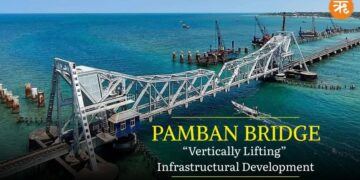In a move that can elevate India’s strategic presence against China and Pakistan, India and Iran on Monday inked a 10-year agreement for the operation of the Chabahar port. Considered an unprecedented shift in regional connectivity, the Chabahar port would compete with China’s Belt and Road Initiative and serve as an alternative to Pakistan’s Gwadar port. The ten-year lease arrangement between the two nations, which will strengthen bilateral connections and promote mutual confidence, irked the US, which threatened India of potential sanctions.
The US released a warning about potential sanctions for those doing business with Tehran, threatening India of “potential risk of sanctions”. However, Vedant Patel, the Principal Deputy Spokesperson for the US State Department, also stated that the US will let the Indian government decide its foreign policy objectives. Giving a contradictory statement, he also underlined that the US is firm about upholding sanctions against Iran even though it respects India’s foreign policy objectives and bilateral ties with Iran. This statement came after EAM Jaishankar expressed trust in the US by saying that it believes the US has no issues with Chabahar because it is something between India and Iran. BYTE: video 2: 0.20 to 0.59 Vedant Patel, Principal Dep. Spox, US State Dept.
The Chabahar port is an important milestone for India that will enable it to increase trade with Central Asia and offer the safe and secure transit of Iranian crude oil around marine choke points such as the Strait of Hormuz. With its advantageous location on the Gulf of Oman, the port that New Delhi first sought to build in 2003, provides Indian exports with an important gateway to landlocked Afghanistan and Central Asia through the International North-South Transport Corridor, bypassing Pakistan. By this India aims to offset Chinese influence by supporting its own connectivity projects, such as Chabahar, while China extends its reach throughout South Asia via the Belt and Road Initiative (BRI). BYTE: video 7: 0.42 to 1.50 S. Jaishankar, EAM
An agreement was made to operate the Shahid-Behesti port as part of the Chabahar Port Development Project between Indian Ports Global Limited (IPGL) and the Port & Maritime Organisation (PMO) of Iran. Both parties intend to continue their partnership in Chabahar following the expiry of the 10-year period. For the duration of the agreement, IPGL will be accountable for equipping and operating the port. According to officials, IPGL plans to equip the port with approximately $120 million. Additionally, India has extended an offer of a rupee credit window worth $250 million for projects that both parties agree upon that will enhance the infrastructure in Chabahar.
India has contributed significantly to the construction as well as operation of this port. The Indian government has attempted to improve the port’s infrastructure and amenities through investments, making it a viable route for shipping Indian goods to Afghanistan and Central Asia.
India’s use of the Chabahar port has been vital in enabling relief supplies to Afghanistan and bolstering trade relations with Iran. India, Iran, and Afghanistan’s trade dynamics may change as a result of the strategically important port. India hopes to avert Pakistan and improve regional connectivity by directly accessing the immense revenue potential of Central Asia. Iran is an essential ally for India’s energy security because of its substantial oil and gas reserves. With a strategic presence in Iran’s energy-rich region because of Chabahar, India can easily utilize Iranian resources.
















Comments